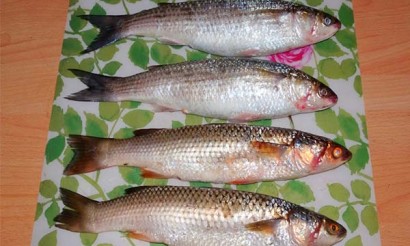What to do if the child refuses to eat
Children are active and on the move. They like to eat on the go, and therefore often grab from the table not the most useful products - cookies, candy, buns and other sweets. At best, they take fruit or nuts from a vase, but even this choice is not always the best.
A child's regimen gets disrupted, he no longer feels hungry, and this becomes a big problem for parents as the time comes to sit the child down at the table to feed him healthy porridge or fresh soup on a schedule. Want to do it easily and without unnecessary arguments, but it succeeds not for everyone. More often than not, the baby goes on refusal - it's hard to do anything about it if he did not like the dish.
A similar problem can arise even with the calmest child who refuses to eat not because hunger is over. He may be used to being obedient, and he may even be very hungry by the time he is invited to the table, but he does not have a great love for certain foods. Or he does not like how these foods are prepared in his family - it also happens. Understandably, the baby begins to turn his nose up. Disappointment was waiting for him on the plate. He wanted something else.
Often old-school people are characterized by specific methods of raising children. They can force the child to eat, almost by force, hovering over him with a threatening look. They can shout at the baby, warning him of the possible deprivation, in case the plate is not empty. Of course, such tips will not be considered in this material, because each child requires an individual and, most importantly, adequate approach.
He should be interested in the prepared dish, and the process of eating should take place in a quiet and peaceful environment. Any need of the body can be turned into a true pleasure, if you approach this issue competently. Eating is no exception to this rule.
The following are the most effective tips on how to get your child interested in food.
Recommendations of experts

Advice #1
If you need to teach your child to eat certain foods, give them support and solidarity. Let your menu spread to all members of the family. If the child sees on the table plates with the same contents, he will automatically lose some questions. At the same time, you can add that his mother cooked with love. Gently explain to the child that cooking - it is work and a demonstration of care. You need to make him sincerely appreciate it.
At a joint lunch or dinner you can praise the dish, thanking its author for his efforts. Children love to imitate adults, especially if they have an undeniable authority in the home. They will be interested in trying something that makes the housemates genuinely delighted. What if it really is very tasty?
Do not do unfair things to children. They may not understand certain things, but their senses are truly acute. Watching mom and dad spoil themselves with tasty and unhealthy sandwiches, the child will certainly not want to eat unleavened porridge. And any entreaties in this case will only make the baby angry. He will be offended. Be friendly in this matter. United for a small victory, you will always get the desired result.
Advice #2.
Do not raise your voice at your child, if he refuses the food that you propose. Maybe yelling can be an effective tool in a single moment, but you should not practice such methods.
You run the risk of permanently instill in the kid a sense of fear, which you can not do. If you traumatize susceptible and vulnerable child's psyche, you can cripple the little man for life. Every time you sit down at the table in a family circle, a child will associate the meal with hard labor and psychological crush. The child's attention will go in the wrong direction.
Most likely he will not be able to relax, which means he will begin to swallow food in chunks. Eating food in such an environment will not bring the slightest bit of pleasure. It will have a negative impact on digestion and on the health of the baby in general. That's not what you're fighting for, is it? Stop emphasizing the child's obedience. The child needs to really love healthy foods. Help him in this.
The child should eat in a calm atmosphere, and do not react to his moods too violently. And what have you done so that he really liked it? Blame yourself, not the baby. The baby can not force himself to choke on food if it does not taste good. He can't get excited about a dish if it doesn't look aesthetically pleasing. Most children do not understand the degree of importance of eating on time, and therefore it is easier for them to give up an unpleasant undertaking than to torture themselves in the name of peace of mind parents.
Involve your baby in children's activities. If he is eating on his own, start telling him an interesting story or a favorite fairy tale. It's great if you can make up a few relevant inserts about vegetables or vitamins. Tell about how much the brave rabbit loves carrots. How the hedgehog dreams of finding a tasty mushroom. And how lucky kid, because it's already on his plate - all that's left to eat.
You can add some useful information, explaining your favorite child, what benefits are these or other products. There is no need to give your child a boring lecture. Talk easily and with a smile, as if your dialogue was by chance.
If your child starts to try foods that he doesn't like, but it's not easy for him to overpower himself, ask him to give you a bite. Show him the reaction - readable, but natural. You will set a good example for him.
Foster a love for healthy foods gradually. Do not count on a quick result in this difficult matter. Don't make your baby eat too much of something he dislikes. Add this ingredient little by little, slightly increasing the portion. If all attempts are in vain, exclude this product from the diet. Find a successful substitute for it. The current range of products in supermarkets and markets allows you to do this without much effort.
Advice ¹3
Do not be afraid to hear criticism about the food you prepare. Children's dissatisfaction with the dish has nothing to do with the child's attitude towards the author of the culinary delicacy. If your child flatly refuses to eat a particular product, regardless of his mood or state of health, ask him for the reason why it happens. Maybe you add too much salt. Or, on the contrary, the dish turns out bland and tasteless. Young children rarely hold back the truth in such matters if you speak to them heartily.
Learn how to prepare a specific product in different ways. Perhaps one of the available cooking methods will appeal to your child more than the others. Stop at a successful variant, try to experiment with the serving. Modern cooking offers plenty of ways to successfully "veil" products that cause antipathy in most children.
Advice #4
As practice shows, children often refuse even their favorite and tasty food, when they are offered something only in words. A distracted and absent-minded child may not understand what it's about, or doesn't want to be distracted from an interesting game for unnecessary reflection. He automatically rejects treats, but does that always mean he really doesn't want to try something tasty or sweet? No, not always.
What can you do to make your baby want to eat healthy fruits or vegetables? Simply place a plate of fruit or vegetable slices in a prominent place. Arrange berries or slices of fruit nicely on a convenient dish so that the mere sight of these foods will create a powerful appetite. Let your child know that you have prepared the goodies.
Otherwise, nothing will work. Seeing unpeeled fruit from the fridge will not make kids want to eat it as a snack.
If you want to accustom your baby to a variety of fruits, and you know ahead of time that there are not the most favorite fruits on the plate, take his favorite fruit as the basis of this cutting. For example, an apple or banana. Decorate the fruit arrangement in such a way that the child immediately sees his favorite treat. Sprinkle a small part of the fruit with nuts or raisins. Hide them behind the other ingredients, so to speak.
Tip #5.

Do not forget that children love anything that awakens their imagination and fantasy. At first, you can come up with your own original designs for different side dishes. As soon as your baby gets interested in unusual dishes, you can offer him to prepare a meal together. Let him help you decorate everything the way he wants. Encourage the baby for his help, give him compliments. He will blossom from your words and be sure to love the new activity.
This tip will help to kill two birds with one stone. Firstly, the baby will get what he likes, and even have a hand in it. It will be harder for him to give up something that took up his personal time. Under such conditions, the chances of children's caprices and tantrums are reduced. Secondly, cooking meals together is very bonding. This is one of the most wonderful ways to build a trusting relationship with your child.
Make sure that the culinary creativity does not turn into disrespect for food. Explain to your baby that playing with food is not allowed. Teach it to be neat, but don't do it too strictly.
When your own imagination starts to fade, you can search the Internet for interesting ideas for decorating children's dishes.
Think of yourself as a child, if you doubt the effectiveness of such recommendations. What would you be happier to see on your plate at the table: an unsightly pile of buckwheat with banal chopped vegetables on the sides or porridge, decorated as a cat's face, with eyes, nose, mouth and even a mustache? The answer is obvious. Your child can't pass up a plate with an edible character from a popular cartoon on it. Take advantage of this trick.
To make the tip work and work further, try to offer your baby variety. Do not repeat in the design of dishes. Let the child will be in anticipation. But also do not accustom him to the original culinary creations, as the norm of things. It should be something joyful, but not easily accessible. Otherwise, any regular dish will be rejected, and this problem will also have to be solved.
Tip #6
Children's whims are a real challenge for parents, but can a child's request always be considered a strange whim? No, not always. You must learn to distinguish between pampering and the normal needs of your child. Sometimes it's just worth listening to the child, so that everything goes as it should. If the baby asks to sit next to him at lunch, try to give him time, even if there is a whole pile of things to do in the kitchen.
In this case, the baby's request can be connected with the fact that he missed you and wants to be together. The interpretation of an inexperienced parent will be different. The father or mother will think that the child is trying to cajole them into eating normally. They will behave in the opposite way, making it clear who is in charge. All the baby wanted was to be kept company.
If your child asks for a favorite drink during a meal, don't refuse it. It is not necessary to accustom your baby to something unhealthy, but you should not completely deprive him of his right to choose. Offer an alternative instead of steadfastly demanding that you finish the sour compote. Make your child fresh juice or offer warm milk, if these products are part of your diet.
Conclusion
Parents should carefully monitor the child's diet, since his small and immature body is in an important stage of formation. At the same time, you can not force the baby with food. You need to act more cleverly, and then the result will definitely come! This article presents the most effective ways to attract the child's interest in food. These recommendations should take on board all who are experiencing difficulties in this matter.
«Important: All information on this site is provided solely for introductory purposes only. Before applying any recommendations, consult a health care professional. specialist. Neither the editors nor the authors shall be liable for any possible harm caused by materials."















